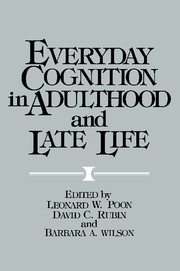Book contents
- Frontmatter
- Contents
- List of contributors
- Preface
- Part I Adult cognitive abilities in the laboratory and in real-life settings: Basic theoretical and methodological issues
- Part IA Systematic approaches to laboratory and real-world research
- Part IB Combining laboratory and real-world research
- Part II Cognition in adulthood and late life: Findings in real-life settings
- Part IIA Everyday cognitive abilities
- 11 Memory for prose: Perspectives on the reader
- 12 Prose processing in adulthood: The text, the reader, and the task
- 13 Speech comprehension and memory through adulthood: The roles of time and strategy
- 14 The effects of aging on perceived and generated memories
- 15 Aging and word retrieval: Naturalistic, clinical, and laboratory data
- 16 Acquisition and utilization of spatial information by elderly adults: Implications for day-to-day situations
- 17 Inner-city decay? Age changes in structure and process in recall of familiar topographical information
- 18 The cognitive ecology of problem solving
- 19 Everyday problem solving: Methodological issues, research findings, and a model
- 20 Prospective/intentional memory and aging: Memory as adaptive action
- Part IIB Concomitant influences
- Part III Cognitive enhancement and aging: Clinical and educational applications
- Part IIIA Issues and perspectives
- Part IIIB Enhancement approaches
- Part IIIC Designing programs for cognitive rehabilitation
- Subject index
- Author index
15 - Aging and word retrieval: Naturalistic, clinical, and laboratory data
Published online by Cambridge University Press: 05 October 2013
- Frontmatter
- Contents
- List of contributors
- Preface
- Part I Adult cognitive abilities in the laboratory and in real-life settings: Basic theoretical and methodological issues
- Part IA Systematic approaches to laboratory and real-world research
- Part IB Combining laboratory and real-world research
- Part II Cognition in adulthood and late life: Findings in real-life settings
- Part IIA Everyday cognitive abilities
- 11 Memory for prose: Perspectives on the reader
- 12 Prose processing in adulthood: The text, the reader, and the task
- 13 Speech comprehension and memory through adulthood: The roles of time and strategy
- 14 The effects of aging on perceived and generated memories
- 15 Aging and word retrieval: Naturalistic, clinical, and laboratory data
- 16 Acquisition and utilization of spatial information by elderly adults: Implications for day-to-day situations
- 17 Inner-city decay? Age changes in structure and process in recall of familiar topographical information
- 18 The cognitive ecology of problem solving
- 19 Everyday problem solving: Methodological issues, research findings, and a model
- 20 Prospective/intentional memory and aging: Memory as adaptive action
- Part IIB Concomitant influences
- Part III Cognitive enhancement and aging: Clinical and educational applications
- Part IIIA Issues and perspectives
- Part IIIB Enhancement approaches
- Part IIIC Designing programs for cognitive rehabilitation
- Subject index
- Author index
Summary
A common complaint among older people is their increasing difficulty in finding common words and proper names with which they are familiar in everyday speaking and writing (e.g., Zelinski, cited in Burke & Light, 1981). At the same time, vocabulary scores indicate that knowledge of word meanings is well maintained with increasing age (Botwinick, 1977; Kramer & Jarvik, 1979). Tulving and Thomson (1973) distinguished between semantic memory (i.e., the store of knowledge about words and concepts, their properties and interrelations) and episodic memory (i.e., the store of knowledge about personally experienced events). Standard laboratory tests have suggested that semantic memory is retained well into old age (Eysenck, 1975; Smith & Fullerton, 1981), in contrast to episodic memory, which shows impairment with age (Craik & Simon, 1980; Perlmutter, 1979). Bowles and Poon (1985a) suggested that the laboratory tasks that have been used to measure semantic-memory functioning are not sensitive to the deficits of which older people complain.
Word retrieval is of special interest in this context because it has been studied in the naturalistic setting (Cohen & Faulkner, 1986; Reason & Lucas, 1983), in the clinical setting (Goodglass, 1980; Nicholas, Obler, Albert, & Goodglass, 1985), and in the laboratory setting (Bowles & Poon, 1985a, 1985b; Brown, 1979). In this chapter it is argued that the research goals differ in these settings, and each makes its own contribution to our understanding of behavior.
- Type
- Chapter
- Information
- Everyday Cognition in Adulthood and Late Life , pp. 244 - 264Publisher: Cambridge University PressPrint publication year: 1989
- 7
- Cited by



